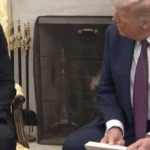Hundreds of farmers gathered outside Downing Street in Westminster today, chanting “no farmers, no food” as Prime Minister Sir Keir Starmer faced tough questioning in the Commons over proposed changes to inheritance tax. The protest, organized by Save British Farming and Kent Fairness for Farmers, saw tractors blocking parts of Whitehall, reflecting growing discontent within the farming community over Chancellor Rachel Reeves’s inheritance tax proposals.
Under the new plans, announced in last month’s Budget, inheritance tax on agricultural assets worth over £1 million will rise to 20%. While the government insists that most farms will remain unaffected, farmers’ groups argue that the threshold is too low for many family-run farms. Around 500 farmers participated in the demonstration, following a rally of approximately 13,000 in the capital last month.
As the protest unfolded, Liberal Democrat leader Sir Ed Davey questioned Sir Keir Starmer in the Commons, urging him to reconsider the impact of the proposed changes on family farms. The Prime Minister responded by stating that the “vast majority” of farms would be unaffected, citing a £3 million threshold for an “ordinary family” farm.
However, many farmers remain unconvinced. Matt Cullen, a beef farmer and organiser with Kent Fairness for Farmers, said, “We need to show this government that we will not be pushed over. This is war, and we will win, forcing the government into a U-turn.”
Among the demonstrators was 26-year-old Claire Fifield, whose step-family runs a tenanted farm in Amersham, Buckinghamshire. She argued that the £1 million threshold was too low given the rising costs of farming: “I don’t think they’ve spoken to a single farmer, especially not a tenant farmer. They looked at Jeremy Clarkson and decided to take his money, but this punishes people who have worked these lands for generations.”
The emotional toll of the dispute was evident during a session of the Commons Environment Committee, where Tom Bradshaw, President of the National Farmers’ Union (NFU), became visibly emotional while discussing the pressure facing some farmers. He expressed concern that middle-aged farmers, fearing the loss of family farms due to the inheritance tax changes, could face severe mental health consequences. “There’s a real risk that some will take their own lives due to financial despair,” he warned.
In Prime Minister’s Questions, Conservative MP Jerome Mayhew reminded Sir Keir Starmer of his pre-election pledge to the NFU, in which he acknowledged that losing a farm is “not like losing any other business.” Sir Keir responded by emphasizing the £5 billion of support pledged to agriculture over the next two years, which includes £350 million allocated just last week.
Despite the government’s commitment to agricultural support, many farmers remain deeply concerned that the inheritance tax reforms will threaten family farms and the long-standing traditions of British agriculture.









